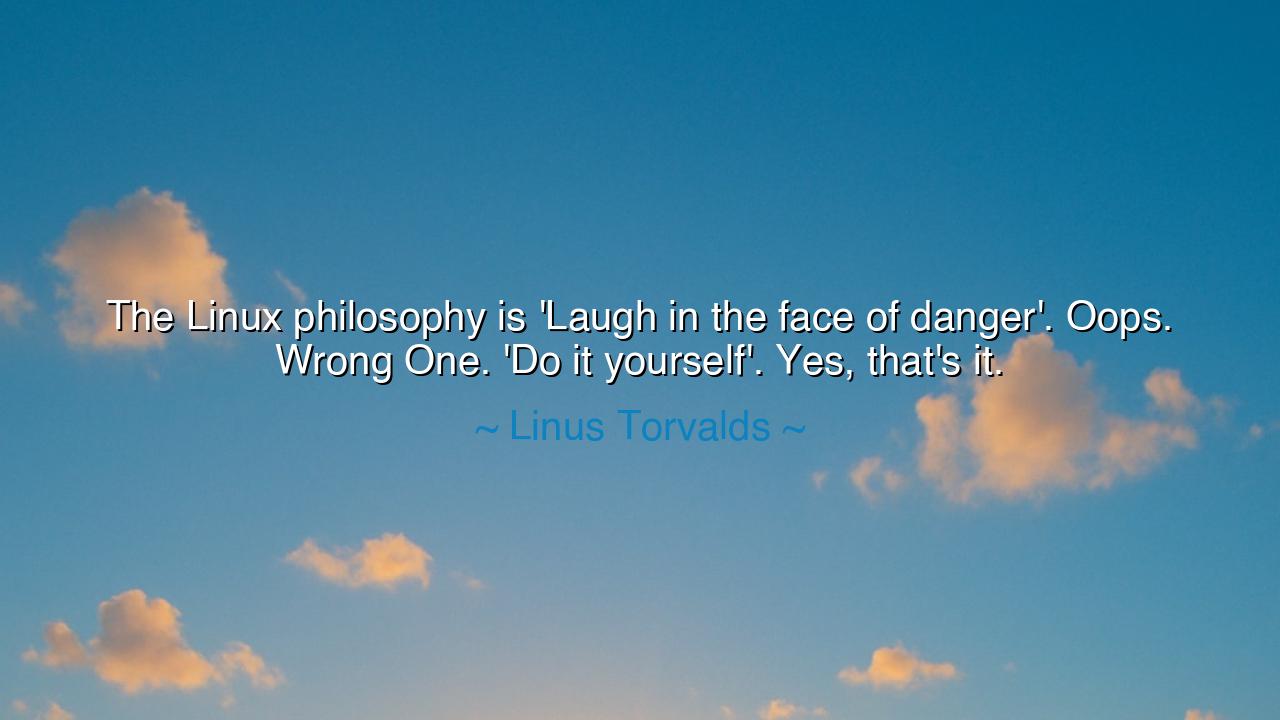
The Linux philosophy is 'Laugh in the face of danger'. Oops.
The Linux philosophy is 'Laugh in the face of danger'. Oops. Wrong One. 'Do it yourself'. Yes, that's it.






Hear now the words of Linus Torvalds, the father of an empire of code, who with wit and humility gave voice to the spirit of creation: “The Linux philosophy is ‘Laugh in the face of danger.’ Oops. Wrong one. ‘Do it yourself’. Yes, that’s it.” Though spoken lightly, as if in jest, this teaching carries the thunder of freedom and the spark of independence. For within it lies a creed not only for coders, but for all who would shape their destiny with their own hands.
The first fragment—“Laugh in the face of danger”—reveals the playfulness of the maker’s spirit. To create boldly, one must cast aside fear. Danger, whether of failure, rejection, or uncertainty, is the constant companion of those who build anew. Yet the true essence of the Linux philosophy is not recklessness, but courage joined with labor: the power to do it yourself, to forge with one’s own mind what others said could not be done. This is the soul of invention, the essence of mastery—that man need not wait for permission, but may seize the tools of creation and make them his own.
Think upon the birth of Linux itself. In the early 1990s, Torvalds, then but a student, looked upon the systems that governed computing. They were costly, restricted, bound by the chains of ownership. But instead of lamenting, he acted. With his own hands, he began to weave the first threads of an open system, free for all to share, free for all to shape. He did not wait for kings or corporations. He embodied the creed: “Do it yourself.” And from that single spark was born a flame that spread across the world, powering servers, phones, and networks that now form the very backbone of the digital age.
This story is not unlike that of the artisans of old, who, when denied the tools of kings, forged their own plows, their own swords, their own vessels. The self-reliant spirit has ever been the foundation of progress. Just as Gutenberg, by his own hands, gave the world the press that shattered ignorance, so too did Torvalds, by his will, give the world a code that shattered monopolies. Thus the Linux philosophy is the ancient creed reborn: trust not in the gifts of others alone, but in the strength of your own labor.
Yet let us not mistake this for prideful isolation. The power of “Do it yourself” is not to sever yourself from others, but to begin with your own effort, so that you may join the greater community as one who contributes, not merely one who consumes. For Linux itself is built not by one man alone, but by countless hands across the earth, each adding, refining, strengthening. The philosophy begins in the individual, but its glory blossoms in the community. The self-reliant act becomes a gift to all, and the circle of creation grows.
Therefore, my child, learn this: do not wait for others to solve your problem, to hand you the path, to place the answer in your lap. Begin with what you have. Build with what you know. Shape what you desire with your own craft. In the beginning, your work may be small, imperfect, fragile—but it is yours, and in it lies the seed of greatness. When you do it yourself, you awaken the spirit of mastery, and no chain can bind the soul that has tasted such freedom.
What then must you do in your own life? When faced with difficulty, resist the temptation to only ask, “Who will fix this for me?” Instead, ask, “What can I learn? What can I create?” Take up the tools before you—whether pen, hammer, or keyboard—and shape them with courage. Share your works, as the builders of Linux shared theirs, and thus weave yourself into the larger tapestry of creation. In this way, you will not merely consume the world—you will help to create it.
Let these words endure as a torch: The Linux philosophy is to “Do it yourself.” For the one who dares to begin, who dares to shape, who dares to contribute, becomes not merely a follower of the world, but a builder of worlds. Laugh at danger, yes—but above all, act, create, and make. For this is the path of freedom, the path of mastery, the path that leaves a legacy not of dependence, but of power shared with all.






AAdministratorAdministrator
Welcome, honored guests. Please leave a comment, we will respond soon